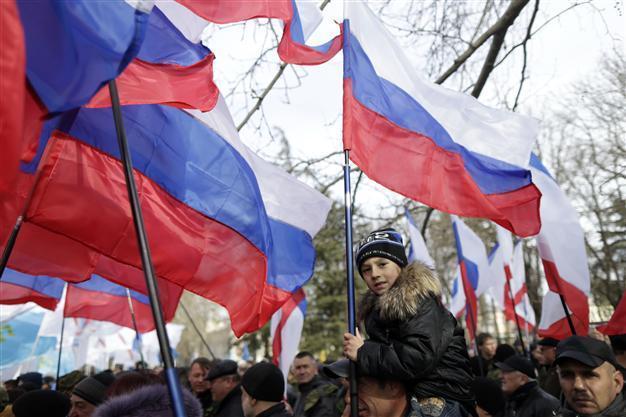Crimea fetes anniversary of vote to join Russia
SEVASTOPOL - Agence France-Presse

A boy holds a Russian flag during a rally marking the one-year anniversary of Crimea voting to leave Ukraine and join the Russian state in central Simferopol on March 16, 2015. AFP Photo
Crimea kicked off celebrations Monday to mark one year since a controversial vote that led to Russia's annexation of the peninsula, a historic shift blasted by the West and Ukraine as an illegal takeover.
Fireworks and concerts were planned in the Black Sea peninsula for the festivities a year after the controversial poll saw residents vote under the watchful eye of elite Russian troops in unmarked uniforms who had swarmed key sites in Crimea two weeks earlier.
Pro-Russian authorities said nearly 97 percent of Crimeans voted to leave Ukraine and become part of Russia in the hastily-organised referendum, but with no independent observers allowed the poll was widely dismissed abroad.
Two days later Putin signed a treaty incorporating Crimea into Russia, sending his ties with the West into a tailspin but boosting his popularity at home to record highs that official statistics said hit 88 percent last week.
As the red, white and blue Russian flag fluttered throughout the peninsula on Monday, the European Union criticised the growing militarisation of Crimea, the home of Russia's Black Sea fleet, under Moscow rule.
"One year after the holding of an illegal and illegitimate referendum of Crimea and Sevastopol by Russia, the European Union is firmly committed to the territorial integrity of Ukraine," EU foreign policy chief Federica Mogherini said in a statement.
In a documentary broadcast on Sunday Putin presented himself as the saviour of Crimea forced to deploy troops to prevent a war with "nationalists" in Kiev. He also said that at the time he had prepared to put his nuclear forces on alert in case of western intervention.
The film showed the lengths he was willing to go to in Crimea after pro-western protesters in Kiev deposed Moscow-backed president Viktor Yanukovych in a street revolt.
"I think no one was in the mood to start a world war," he said, hailing the work of thousands of special forces, land, air and sea troops who intervened in Crimea.
A year ago, he denied the men in unmarked uniforms were Russian troops.
The annexation of Crimea was a critical event in the Ukrainian crisis which many believed triggered the separatist uprising in eastern Ukraine where over 6,000 have since been killed in fighting.
The Kremlin has denied accusations it has troops in eastern Ukraine and that it is arming the rebels.
In the documentary, Putin insisted his takeover of Crimea had prevented the bloodshed seen in eastern Ukraine.
"The choice was obvious: Ukraine, blood and war, or Russia, peace and stability," Crimea's leader Sergei Aksyonov said in a speech to officials in the regional capital of Simferopol on Monday.
Across Crimea, the day began with a special lesson taught in all the peninsula's schools on "Russia and Crimea's shared fate."
To many Russians, Crimea's takeover by Russia renders historic justice after Soviet leader Nikita Khrushchev handed the strategically important peninsula to Ukraine in 1954 in what was then a largely symbolic move since Ukraine and Russia were both part of the USSR.
Putin's envoy to Crimea, Oleg Belaventsev, hailed what he called a "historic referendum" in a special session of the peninsula's parliament.
Several thousand people gathered in the centre of the port city of Sevastopol for a four-hour-long concert and fireworks display.
"We are glad we have joined Russia," said engineer Ivan Grigorevich, 65, who like others at the square criticised Crimea's leaders.
The authorities "are stealing a lot. There's no one in charge of the city. Under the Ukraine regime it was much cheaper, I could live on 300 hryvnias. Now 20,000 rubles is just nothing," he told AFP.
The celebrations cap a tough year for Crimeans who have become increasingly isolated after Kiev cut transport links and imposed an effective economic blockade on the peninsula, leaving an unreliable ferry to Russia as their main link to the outside world.
The economy has also been strangled by Western sanctions preventing investment in the region and a drop in tourists to its once-popular beaches.
However while many young Crimeans have left the peninsula and indigenous Tatars complain about a climate of fear under Russian rule, a Ukrainian poll this month showed 82 percent of residents support joining Russia. Only four percent were opposed.
But with Western sanctions hitting Russia's economy hard, the popular Moskovsky Komsomolets daily wondered if the price of having Crimea back in the fold was worth it.
"From the point of view of an average European, Russia is a dangerous and incomprehensible force which refuses to live by the rules and constantly threatens to destroy the cosy little world built by the European Union," read an editorial in the paper.
"Crimea is ours, of course. But how long will Russia have to keep paying for this and how many zeroes will there be in the final sum, not even Putin knows."
